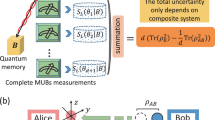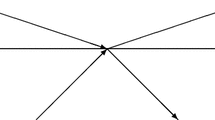Abstract
Perfect knowledge of the many-body system is contained in the wavefunction but, as Schrodinger has already emphasized, best possible knowledge of a whole does not include the best possible knowledge of its parts. Separability from the point of view of quantum mechanics is discussed. General “entangled” systems are analysed in terms of knowledge. If the state vector is defined for a whole system its parts are described only by mixed density operators. Correlations violating Bell’s inequality are necessary to avoid super luminal signaling and result from the lack of independent reality of subsystems. Model calculations on two separated atoms and on non- interacting gas show that the perfect knowledge of the whole system or the total wavef unction is not sufficient to calculate local properties without actually solving the local problem.
Access this chapter
Tax calculation will be finalised at checkout
Purchases are for personal use only
Preview
Unable to display preview. Download preview PDF.
Similar content being viewed by others
References
The Wave-Particle Dualism, Eds: S. Diner, D. Fargue, G. Lochak, F. Selleri. D. Reidel, Dordrecht 1982
A. Einstein, B. Podolsky, N. Rosen, Phys. Rev. 47,777(1935)
E. Schrödinger, Naturwissenschaften 23,807; 823; 844(1935); Proc. Cambridge Phil. Soc. 31,555(1935); ibid. 32,446(1936)
N. Rosen, in: Symposium on the Foundations of Modern Physics, Eds. P. Lahti, P. Mittelstaedt, World Scientific, Singapore 1985, p. 17
H-J. Treder, Astron. Nachr. 304,145(1983)
C. Piron, in [4], p. 207
D. Aerts, Found. Phys. 12,1131(1982);
D. Aerts, in [4], p. 305
O. Costa de Beauregard, Found. Phys. 15,871(1985)
J. S. Bell,Physics 1,195(1965)
A. Pais, ′Subtle is the Lord′, Oxford Univ. Press 1982
O. Piccioni, V. Mehihop, in [4], p. 197
D. Bohm, Y. Aharonov, Phys. Rev. 108,1070(1957)
D. J. Bohm, B. J. Hiley,II luovo Cim. 35,137(1976)
F. Selleri, Found. Phys. 12, 1087(1982)
F. Selleri, ′History of the EPR Paradox′, in: Quantum Mechanics Versus Local Realism: the Einstein-Podolsfcy-Kosen Paradox, Plenum Publ. Co, London-Hew York 1987
V. Capasso, D. Fortunato, F. Selleri, Int. J. Theor. Phys. 7,319(1973)
V. Duch, ′Violation of Bell inequalities in interference experiments′, in: Open Problems in Physics, Eds. L. Kostro et.al, World Scientific, Singapore (in print); Correlations violating Bell′s inequality are necessary to save locality, Phys. Rev. Lett (submitted).
A.S. Davydov, Quantum Mechanics, Moscow 1963
P. Arrighini, Intermolecular Forces and Their Evaluation by Perturbation Theory, Lecture Notes in Chem. 25, Springer 1981
A. J. Legget, in: Quantum Concepts in Space and Time, Ed. R. Penrose, C.J. Isham, Clarendon Press, Oxford 1986
W. Duch, D. Aerts, Phys. Today 6,13(1986)
T.A. Brody, Rev. Mexicana de Fisica 29,461(1983)
Author information
Authors and Affiliations
Editor information
Editors and Affiliations
Rights and permissions
Copyright information
© 1989 Kluwer Academic Publishers
About this paper
Cite this paper
Duch, W. (1989). Schrödinger’s Thoughts on Perfect Knowledge. In: Bitsakis, E.I., Nicolaides, C.A. (eds) The Concept of Probability. Fundamental Theories of Physics, vol 24. Springer, Dordrecht. https://doi.org/10.1007/978-94-009-1175-8_2
Download citation
DOI: https://doi.org/10.1007/978-94-009-1175-8_2
Publisher Name: Springer, Dordrecht
Print ISBN: 978-94-010-7023-2
Online ISBN: 978-94-009-1175-8
eBook Packages: Springer Book Archive




